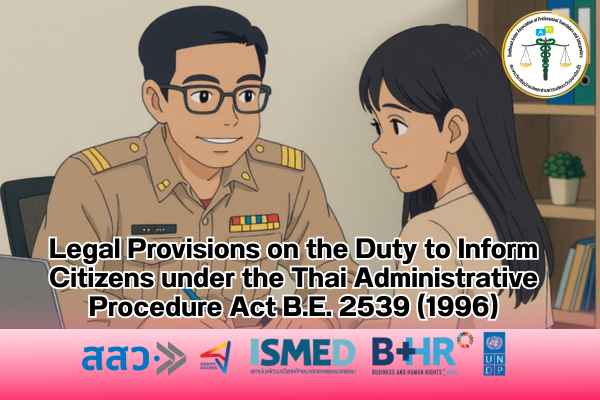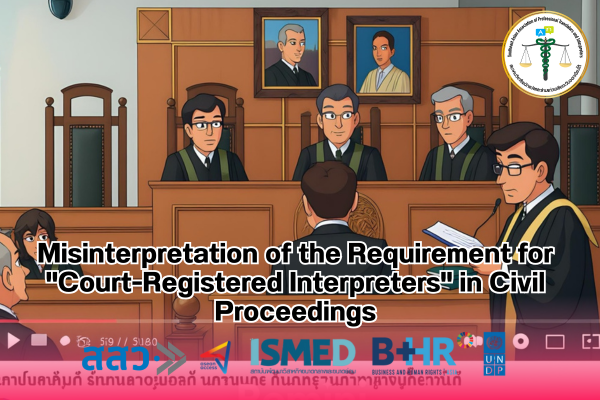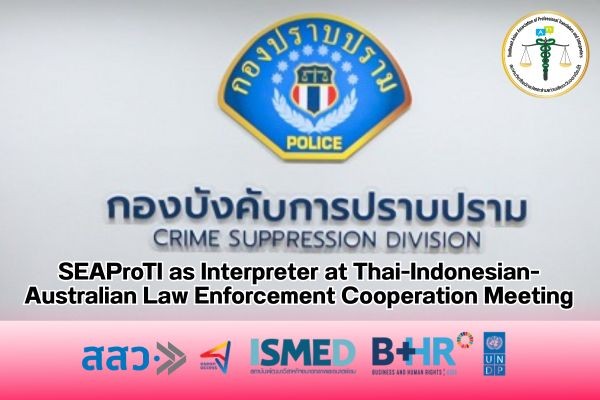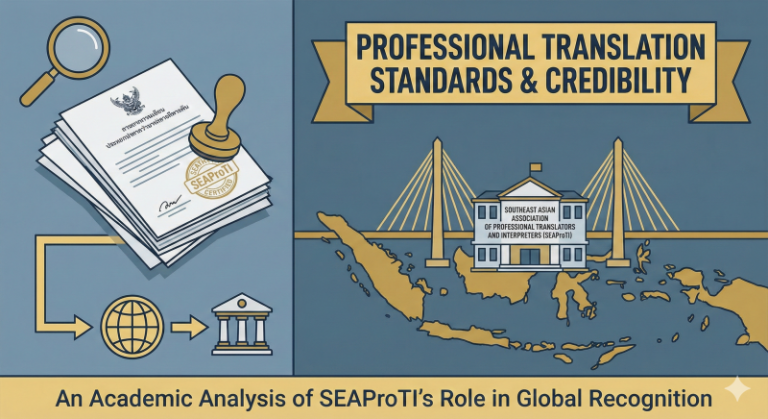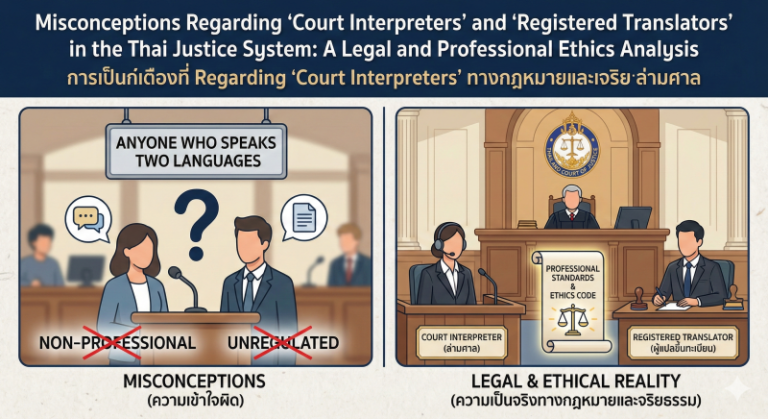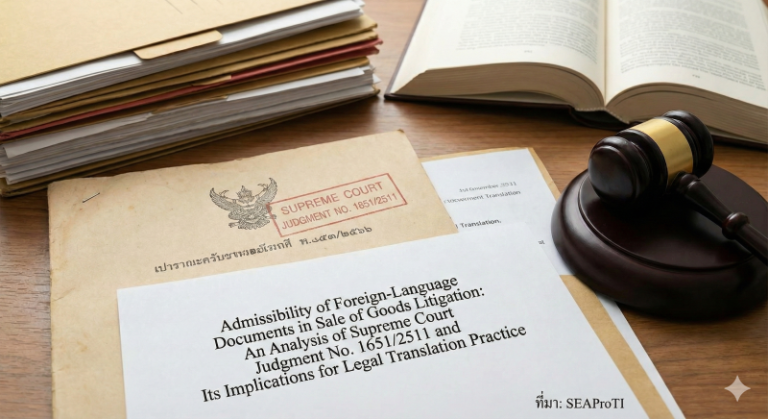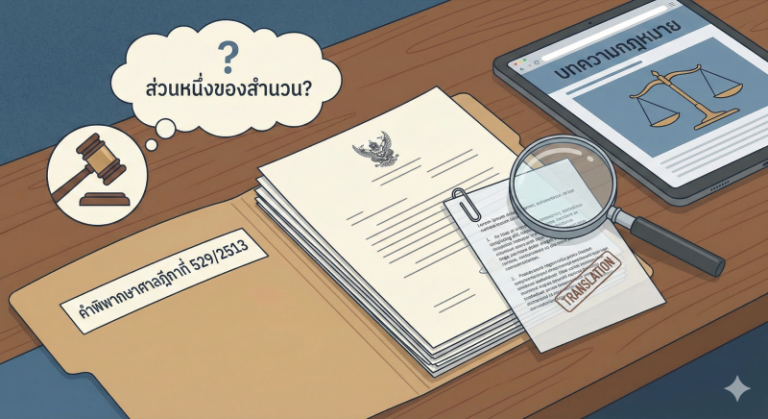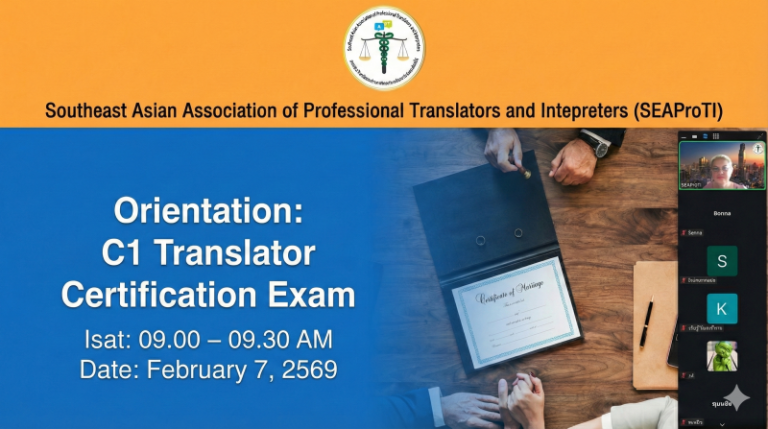Legal Provisions on the Duty to Inform Citizens under the Thai Administrative Procedure Act B.E. 2539 (1996): Transparency, Rights Awareness, and the Responsibility of Public Officials
Abstract
5 July 2025, Bangkok – This article explores the legal obligations imposed upon public officials under the Thai Administrative Procedure Act B.E. 2539 (1996) with respect to informing citizens of their rights and relevant procedures. Emphasizing the principles of fairness, transparency, and accountability in administrative processes, the paper examines key statutory provisions and discusses their practical implications, including specific situations such as the translation and certification of documents. It is argued that public officials are legally required to actively assist individuals in understanding procedural rights, especially where the lack of information may cause individuals to lose their legal entitlements.
1. Introduction
The Administrative Procedure Act B.E. 2539 (1996) serves as a foundational framework governing the actions of administrative agencies in Thailand. One of its central aims is to uphold the rule of law and safeguard citizens’ rights through procedures that are just, transparent, and subject to review. Among its most significant features is the statutory obligation of public officials to provide sufficient information to the public and ensure that individuals understand their legal rights and responsibilities in administrative proceedings.
2. The Duty to Inform: A Principle of Procedural Fairness
The duty to inform is not merely passive disclosure. It includes active efforts by public officials to guide, clarify, and ensure that citizens can meaningfully participate in administrative processes. This duty is essential in guaranteeing that decisions affecting individual rights are not made in a vacuum of understanding or opportunity.
3. Key Statutory Provisions
Section 27
Public officials must inform concerned parties of their procedural rights and obligations as necessary. If an application or statement is defective or incomprehensible, the official must guide the party in correcting or supplementing the submission appropriately.
Section 30
Where an administrative order may affect the rights of any party, the official must ensure that such party has adequate access to relevant facts and an opportunity to present arguments and supporting evidence.
Section 31
A concerned party has the right to access any documents necessary to rebut or clarify issues or to defend their legal rights, except in cases where legal confidentiality applies.
4. Best Practices in Implementation
In practice, the legal duties of officials include:
- Clearly informing the public of the required documents, procedural timelines, and steps in submitting an application;
- Notifying individuals of their rights to appeal or object to an administrative order;
- Allowing access to documents that pertain to a person’s case or situation;
- Assisting citizens in correcting or completing improperly submitted documentation.
5. Case Example: Translations and Certified Translations
A particularly relevant example is when citizens are required to submit translated documents in foreign languages for administrative procedures. Often, individuals are unaware of the legal requirements concerning document translation and certification.
According to the Ministerial Regulation B.E. 2540 (1997), issued under the Administrative Procedure Act, official translations must be completed and certified in accordance with specific legal standards. If the public is unaware of these obligations, it becomes the official duty of administrative staff to provide appropriate guidance. Failure to do so may result in procedural injustice or the denial of rights due to technical noncompliance.
Thus, the duty to inform extends to clarifying:
- Who is authorized to certify translated documents;
- What format and certification process is legally acceptable;
- Which steps the citizen must follow to ensure that their submissions are valid under Thai administrative law.
6. Conclusion
The duty to inform under the Administrative Procedure Act B.E. 2539 (1996) is a cornerstone of good governance. It not only empowers citizens to protect their rights but also compels administrative bodies to act transparently and lawfully. In complex matters such as the translation and certification of documents, public officials must actively bridge knowledge gaps to prevent procedural disadvantage caused by ignorance. Such obligations are essential to achieving the broader goals of fairness, participation, and accountability in public administration.
References
- Administrative Procedure Act B.E. 2539 (1996) [Thailand].
- Ministerial Regulation B.E. 2540 (1997) issued under the Administrative Procedure Act.
- Office of the Council of State. (2017). Official Handbook on the Administrative Procedure Act.
- Southeast Asian Association of Professional Translators and Interpreters (SEAProTI). (2025). Professional Standards for Certified Translation under Thai Law.
SEAProTI’s certified translators, translation certification providers, and certified interpreters:
The Southeast Asian Association of Professional Translators and Interpreters (SEAProTI) has officially announced the criteria and qualifications for individuals to register as “Certified Translators,” “Translation Certification Providers,” and “Certified Interpreters” under the association’s regulations. These guidelines are detailed in Sections 9 and 10 of the Royal Thai Government Gazette, issued by the Secretariat of the Cabinet under the Office of the Prime Minister of the Kingdom of Thailand, dated July 25, 2024, Volume 141, Part 66 Ng, Page 100. the Royal Thai Government Gazette
ข้อกำหนดเกี่ยวกับการให้ข้อมูลแก่ประชาชนตามพระราชบัญญัติวิธีปฏิบัติราชการทางปกครอง พ.ศ. 2539:
ความโปร่งใส สิทธิของประชาชน และบทบาทของเจ้าหน้าที่รัฐในการสื่อสารข้อมูล
บทคัดย่อ
5 กรกฎาคม 2568, กรุงเทพมหานคร – บทความนี้วิเคราะห์ข้อกำหนดทางกฎหมายเกี่ยวกับหน้าที่ของเจ้าหน้าที่รัฐในการให้ข้อมูลแก่ประชาชนตามพระราชบัญญัติวิธีปฏิบัติราชการทางปกครอง พ.ศ. 2539 โดยเน้นย้ำหลักการความโปร่งใส ความเป็นธรรม และสิทธิในการรับรู้ข้อมูลของประชาชนในกระบวนการทางปกครอง บทความยังชี้ให้เห็นถึงกรณีเฉพาะที่เจ้าหน้าที่จำเป็นต้องแจ้งสิทธิและหน้าที่ให้แก่ประชาชน เช่น กรณีการแปลเอกสารและการรับรองการแปล เพื่อป้องกันการเสียสิทธิจากความไม่รู้และเพื่อส่งเสริมหลักนิติธรรมในกระบวนการทางปกครอง
1. บทนำ
พระราชบัญญัติวิธีปฏิบัติราชการทางปกครอง พ.ศ. 2539 ถือเป็นกลไกสำคัญที่วางหลักการพื้นฐานในการดำเนินการของฝ่ายบริหาร โดยมีเป้าหมายเพื่อคุ้มครองสิทธิของประชาชนให้ได้รับความเป็นธรรม ความโปร่งใส และสามารถตรวจสอบการกระทำของรัฐได้ หนึ่งในหลักการสำคัญที่บัญญัติไว้ในกฎหมายฉบับนี้ คือ หน้าที่ของเจ้าหน้าที่รัฐในการให้ข้อมูลและแจ้งสิทธิแก่ประชาชน อย่างเพียงพอและเหมาะสม
2. หลักการสำคัญของการให้ข้อมูล
การให้ข้อมูลไม่ใช่เพียงการตอบคำถามหรือให้เอกสารแก่ประชาชนเท่านั้น หากแต่หมายรวมถึงการ แจ้งสิทธิของประชาชน การแนะนำแนวทางที่ถูกต้อง และการให้โอกาสประชาชนในการใช้สิทธิโต้แย้งหรือป้องกันตนเอง ได้อย่างมีประสิทธิภาพ
3. บทบัญญัติที่เกี่ยวข้องในพระราชบัญญัติฯ
มาตรา 27
กำหนดให้เจ้าหน้าที่ต้องแจ้งสิทธิและหน้าที่ในกระบวนการพิจารณาทางปกครองแก่คู่กรีตามความจำเป็น และหากมีการยื่นคำขอหรือคำแถลงที่ไม่สมบูรณ์ เจ้าหน้าที่มีหน้าที่แนะนำการแก้ไขเพื่อให้เป็นไปตามกฎหมาย
มาตรา 30
เมื่อคำสั่งทางปกครองอาจกระทบสิทธิของประชาชน เจ้าหน้าที่ต้องให้โอกาสประชาชนได้รับทราบข้อเท็จจริง และสามารถโต้แย้งหรือแสดงพยานหลักฐานของตนได้
มาตรา 31
ประชาชนมีสิทธิตรวจดูเอกสารที่เกี่ยวข้องเพื่อการใช้สิทธิของตน เว้นแต่กรณีนั้นจะมีข้อจำกัดเรื่องความลับตามกฎหมาย
4. ตัวอย่างการปฏิบัติที่ดีของเจ้าหน้าที่
- แจ้งขั้นตอน ระยะเวลา และเอกสารที่จำเป็นต่อการยื่นคำขอ
- แจ้งสิทธิในการอุทธรณ์หรือโต้แย้งคำสั่งทางปกครอง
- อธิบายทางเลือกที่ประชาชนสามารถดำเนินการได้ในแต่ละขั้นตอน
- ให้สิทธิในการตรวจสอบข้อมูลหรือเอกสารที่เกี่ยวข้อง
- แนะนำให้แก้ไขคำร้องหรือคำแถลงที่คลาดเคลื่อน
5. กรณีศึกษาการแปลเอกสารและการรับรองการแปล
หนึ่งในประเด็นที่มักพบในทางปฏิบัติ คือ ประชาชน ไม่ทราบว่าการแปลเอกสารราชการและการรับรองการแปลต้องเป็นไปตามกฎหมายและระเบียบราชการ เช่น กฎกระทรวง พ.ศ. 2540 ซึ่งออกตามพระราชบัญญัติวิธีปฏิบัติราชการทางปกครองฯ เพื่อกำหนดรูปแบบและผู้ที่มีอำนาจรับรองการแปล
ในกรณีเช่นนี้ หากประชาชนไม่ทราบขั้นตอน เจ้าหน้าที่มีหน้าที่ตามมาตรา 27 ในการแจ้งให้ประชาชนทราบว่าเอกสารแปลใดที่สามารถยื่นใช้ได้ และการรับรองการแปลต้องทำโดยบุคคลหรือหน่วยงานใด เพื่อไม่ให้ประชาชนเสียสิทธิในการดำเนินการทางปกครอง เช่น การยื่นคำขอ การอุทธรณ์ หรือการโต้แย้งคำสั่ง
6. บทสรุป
หน้าที่ของเจ้าหน้าที่รัฐในการให้ข้อมูลและแจ้งสิทธิตามพระราชบัญญัติวิธีปฏิบัติราชการทางปกครอง พ.ศ. 2539 เป็นกลไกสำคัญในการคุ้มครองสิทธิของประชาชนและสร้างความโปร่งใสในการบริหารราชการแผ่นดิน โดยเฉพาะในกรณีที่ประชาชนต้องยื่นเอกสารแปลหรือคำร้องในภาษาต่างประเทศ เจ้าหน้าที่ต้องไม่ละเลยในการอธิบายสิทธิ หน้าที่ และแนวทางปฏิบัติที่ถูกต้อง เพื่อมิให้เกิดความเสียหายแก่ประชาชนจากความไม่รู้ของตนเอง ซึ่งสอดคล้องกับหลักการของรัฐธรรมนูญและการบริหารงานที่ดี
อ้างอิง (References):
- พระราชบัญญัติวิธีปฏิบัติราชการทางปกครอง พ.ศ. 2539
- กฎกระทรวง พ.ศ. 2540 ออกตามความในพระราชบัญญัติวิธีปฏิบัติราชการทางปกครอง พ.ศ. 2539
- สำนักงานคณะกรรมการกฤษฎีกา. (2560). คู่มือการปฏิบัติงานของเจ้าหน้าที่ตาม พ.ร.บ. วิธีปฏิบัติราชการทางปกครอง พ.ศ. 2539.
- สมาคมวิชาชีพนักแปลและล่ามแห่งเอเชียตะวันออกเฉียงใต้ (SEAProTI). (2568). คู่มือการแปลและรับรองการแปลตามกฎหมายไทย.
เกี่ยวกับนักแปลรับรอง ผู้รับรองการแปล และล่ามรับรองของสมาคมวิชาชีพนักแปลและล่ามแห่งเอเชียตะวันออกเฉียงใต้
สมาคมวิชาชีพนักแปลและล่ามแห่งเอเชียตะวันออกเฉียงใต้ (SEAProTI) ได้ประกาศหลักเกณฑ์และคุณสมบัติผู้ที่ขึ้นทะเบียนเป็น “นักแปลรับรอง (Certified Translators) และผู้รับรองการแปล (Translation Certification Providers) และล่ามรับรอง (Certified Interpreters)” ของสมาคม หมวดที่ 9 และหมวดที่ 10 ในราชกิจจานุเบกษา ของสำนักเลขาธิการคณะรัฐมนตรี ในสำนักนายกรัฐมนตรี แห่งราชอาณาจักรไทย ลงวันที่ 25 ก.ค. 2567 เล่มที่ 141 ตอนที่ 66 ง หน้า 100 อ่านฉบับเต็มได้ที่: นักแปลรับรอง ผู้รับรองการแปล และล่ามรับรอง


